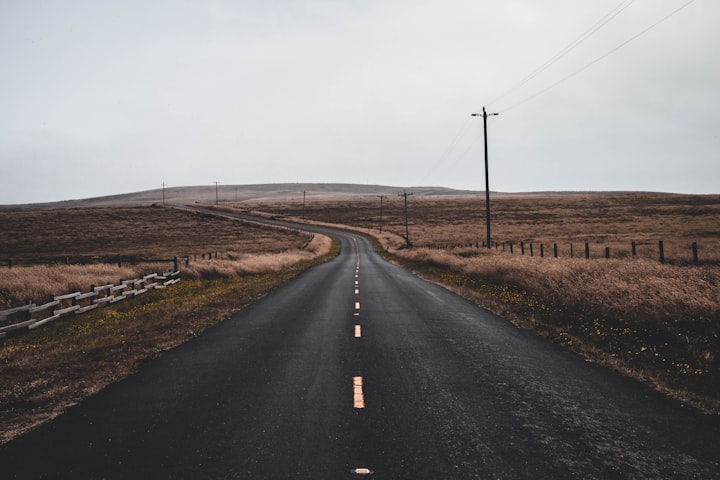What Travel Taught Me About Navigating a Crisis
Adaptation is everything.

Hard times test us all
When everything falls apart, we all become the sum of the things we’ve learned. And how we deal with a crisis depends heavily on what we’ve learned about ourselves and the world around us.
This year, an iron gate clanged shut. I found myself on the wrong side of it. Like the protagonist of Kafka’s The Trial, I felt as though I had made some mistake I couldn’t identify. One that was going to follow me forever after.
Let me explain.
Back in 2016, I was running a pest control company with a friend. A profitable small business, the kind that makes millionaires next door while nobody notices.
It was going well. But I wasn’t happy. I was drinking too much. Alcoholism is the curse of the small business owner. Some nights, instead of drinking, I would get in my company truck and just drive, endlessly circling a city I hated on the snow-flecked ring road that surrounded the heartless suburbs.
So we sold the company. Four years of chasing dollars was enough for me. Instead, me and my wife and our polydactyl cat took the money we got and moved to Italy.
We planned to stay for six months. Instead, we ended up spending two years moving between Italy and France. The money ran out, but we learned to make more. It was the best time of my life.
Late in 2018, we decided to come back to Canada. At least temporarily. My wife wanted to start her own business in the country she was born. I had real estate to sell. So we came back and sold my apartment.
Then her father died. As a dutiful only child who loved her dad very deeply, she needed time to process her grief and support her mother. You know what happened next. Covid 19 shut down the whole world. Now, while cases soar and the death toll climbs, Europe is closed to me.
My problems are not unique
In one way or another, most of us feel trapped right now. Maybe all of us. As the ancient Stoics and their modern inheritors always said, what matters most in life is not what happens to you, but how you deal with it. Getting through 2020 is forcing all of us to plumb the depths of our resilience to changing circumstances.
If I hadn’t had the experiences I did while I was living abroad, I would be finding this period of stasis a lot harder to deal with. Maybe I’d be climbing the walls like some of my friends are. Maybe I’d be lashing out, picking at every wrinkle in my relationships until they turned to festering wounds.
But I’m not. I’m doing okay. And while I’m looking forward to the pandemic being over and the road being clear of obstacles so that I can travel again, I know I can wait it out. I know I can outlast the problems of the moment and come out on the other side stronger.
Because my two years on the road living as a digital nomad (if we must use the tarnished term) taught me priceless lessons. Lessons that help me cope with the hopefully temporary loss of the life I wanted. Lessons that have helped me cultivate resilience to circumstances that seem to terrify everyone else I know.
Here’s what I learned.
Stay flexible
The art of travel is primarily the art of adaptation. Living in a country where you don’t speak the language teaches you to roll with uncertainty. Similarly, being a vegetarian in France trains you not to expect too much.
Opportunities bloom and die like fruit fly swarms in a sloppy kitchen. Staying afloat means staying responsive to sometimes rapid change. When one door closes, you need to already know where you can find another. Or else be prepared to kick a hole in the wall.
Don’t rely on a single income stream
Part of being flexible means not getting too dependent on any one thing. What puts a lot of people off doing what we did is the security of a steady job. But I’ve been laid off enough in my life to know that security is an illusion. Having multiple clients is a lot safer than relying on one single company to keep you employed.
For a while, we successfully gambled for a living. There was also a period when we mined bitcoin for profit. Both of those avenues are closed now. But even when they were open, I was always looking for the next thing to support us. So that by the time those revenue streams became untenable, I had already learned how to make a living writing online.
If we had relied on any single thing to support us, our dream would’ve come crashing down when that thing evaporated. Instead, we stayed open to new opportunities. Now, neither one of us have had a real job in four years. Hopefully, we’ll never have to do it again.
In his book DO OVER, Jon Acuff suggests using index cards to list everything you’re good at. Even if you don’t see how it could help you, write it down. Once you have a few things written, look for patterns. These patterns will lead you to where your skills lie. Then you can start thinking about how to sell those skills to people who need them
Your skills and talents will be different from mine. But you can use the same principle to keep your own income stable and growing. Whatever it is you’re good at, chances are there’s a market for it out there somewhere. And it’s never been easier to find that market.
I’m a professional writer who never came close to getting a degree and who never took a single course to teach me how to do what I do. If I can invent a whole new career for myself just by taking low-paying jobs online and steadily building a list of regular clients, so can you.
Keep refining your process
As writing became a bigger part of my income, I was forced to adapt.
We traveled a lot, and dead time on planes and in airports is perfect for making money. But a 14-inch laptop doesn’t fit on a Ryanair tray table. And when you travel on a shoestring, every pound of weight you can shed helps save money. So I got myself a folding Bluetooth keyboard and used my phone to write articles on trains and planes and in airport lounges.
Writing for a living, especially when you first start, means writing A LOT. And before too long, I developed repetitive strain injury from too much typing at unergonomic desks. (Note to writers: DO NOT put off setting up a proper workspace!) So I learned to use dictation software. Not only did this spare my arms, but it ended up dramatically increasing my productivity and thereby my earnings.
These are just examples. You don’t have to travel to keep refining your own process. Just don’t settle for what you are currently doing. There’s a human bias toward doing things the way they’ve always been done. But there is almost always a better, easier, more efficient way. Never stop honing your process as you go.
You don’t need as much as you think
Baggage limits enforced by budget airlines teach you to pare things down. But travel only tells you what you already secretly know. Most of what you own is worthless. And if you’re not careful, like Chuck Palahniuk warned, it ends up owning you.
When I left Canada, I left behind a collection of rare whiskeys that had taken years to build. That, and my precious first edition books. Meanwhile, my wife was forced to part with all kinds of treasured items as we shrank our former lives down into a single suitcase each.
We barely missed any of it. We had each other. We had the cat. We had a hundred ways to stay in touch with family and friends. That’s plenty. Certainly more than our ancestors had when they set out for new lands in search of a distant bright horizon.
The less you own, the more flexible you become. Strong oaks crack under the weight of snow while flexible pines drop the load and thrive through the winter. Stay light. Stay flexible. That’s what makes you unbreakable.
Savor the small wins
I know you’ve heard this before. But that’s because it’s true. Being goal-oriented in life is not by any means a bad thing. Like just about anything, it only becomes harmful when it causes you to lose sight of everything else. Building resilience in a changing world is largely a matter of small steps that build up to significant difference over time.
Often, the most resilient people got that way through a series of setbacks. Like Edison used to say, failure is nothing more than finding the ways that don’t work so you can clear the path to what does.
But since this is a long journey, it’s important to try to enjoy yourself along the way. Spend a long plane ride scowling at the back of the seat in front of you and thinking about just how long you have to sit there breathing other people’s body odor, and you’ll be ready to murder before the seatbelt light comes off. Focus instead on making things as pleasant for yourself as you can, and those hours will go by a lot quicker.
The same is true of every journey. Find something to enjoy along the way, and you’ll find it a lot easier to reach your destination, whatever it may be.
Lessons from the road…
Right now, no one’s going anywhere. If you’re not currently in some government-mandated isolation, you probably will be soon. And viruses aren’t the only thing that can kill people. The hopelessness and despair and grief over our old lost lives can be easily as deadly.
But travel taught me more than just the price of a beer in Warsaw or how to ask for the bill in Italian. It taught me that, while we can’t control our circumstances, we can control our reactions. Staying adaptable and open to new opportunities will get us through this crisis, and any other that’s coming our way.
About the Creator
Ryan Frawley
Towers, Temples, Palaces: Essays From Europe out now!
Novelist, entomologist and cat owner. Ryan Frawley is the author of many articles and stories and one novel, Scar, available from online bookstores everywhere.






Comments
There are no comments for this story
Be the first to respond and start the conversation.